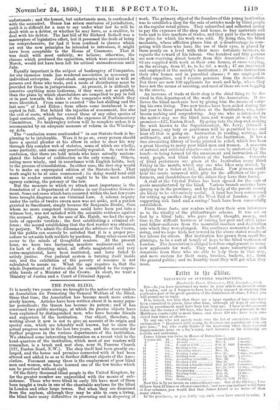THE POOR BLIND.
IT is nearly two years since we brought to the notice of our readers an Association for Promoting the General Welfare of the Blind. Since that time, the Association has become much more exten- sively known. Articles have been written about it in many popu- lar periodicals; the Queen has become its patron ; and it has convened two public meetings, at which its precise objects have been explained by distinguished men, who have become friends and supporters of the institution. Our object, therefore, in writing about it now is not to give an account of its origin and special aim, which are tolerably well known, but to show the actual progress made in the last two years, and the necessity for further progress in the various departments of the institution. We obtained some interesting information on a recent visit to the head-quarters of the institution, which most of our readers will remember, is a brush and mat shop, near St. Pancras Church (127, Euston Road, N.W.). The shop itself had been greatly en- larged, and the house and premises connected with it had been altered and added to so as to further different objects of the Asso- ciation. Foremost among these is the employment of poor blind men and women, who have learned one of the few trades which can be practised without sight.
Of the thirty thousand blind people in the United Kingdom, by far the greater number are improvided with the means of sub- sistence. Those who were blind in early life have most of them been taught a trade in one of the charitable asylums for the blind in London and other large towns. But when they are dismissed from the asylum, although they may be able to earn a living, the blind have many difficulties in procuring and in disposing of
work. The primary object of the founders of this young institution was to establish a shop for the sale of articles made by blind people at the regular retail prices. They subscribed and oolleoted money to pay the expenses of the shop and house, to buy materials and tools and to hire teachers of trades, and they paid to the workman the price for which his work was sold. By doing this, the blind mechanio whose affliction places him at a disadvantage iu com- peting with those who have the use of their eyes, is placed by
them nearly on a level with their more fortunate brothers, as regards the reward of his labour. One hundred and fifty persons are now receiving direct benefit from this Association ; of these 63 are supplied with work at their own homes, at sums varying, on the average, from 1/. 4s. to Is. 6d. a week ; 47 are instructed and employed at the society's institution ; 28 receive instruction
their own homes and in parochial classes; 9 are employed in official capacities, and 3 receive pensions from the Association. But there are now 130 applicants for work and help, whom they have not the means of assisting, and most of these are now begging in the streets.
An increase of trade at their shop is the chief thing to be de- sired in this department of the work of the Association. It re- lieves the blind mechanic best by giving him the means of earn- ing his own living. Two new trades have been added during the last year to those practised before at the Institution, viz., hair- broom making and carpentering. Any one who is interested in the matter may see the blind man and woman at work on the premises-127, Euston Road. By going into the shop and making the wish known to the Superintendent, Mr. Levy, (himself a blind man,) any lady or gentleman will be permitted to see and hear all that is going on. Instruction in reading, writing, and
arithmetic, and in music is given at the Institution. It a free circulating library of books printed in relief, which has been a great blessing to many poor blind men and women. A museum
of natural and artificial objects—such as can be undertood by the touch—is being formed for the amusement and instruction of the work people and blind visitors of the Institution. Concerts
of blind performers are given at the Institution every third Friday in the month, which any one who likes may attend, by applying for a ticket at 127, Euston Road. Few persons could hear the music unmoved with pity for the affliction of the per- formers, and thankfulness for the solace they have thus found. A stall at the Crystal Palace has been opened for the sale of goods manufactured by the blind. Various branch societies have sprung up in the provinces, and by the help of the parent society are likely to be extensively useful. A fund has been commenced for setting up another shop at the West End of London. A self- supporting sick fund and a savings' bank have been successfully established.
From these facts, our readers will draw their own inferences as to the vitality of the philanthropic scheme. It was set on
foot by a blind lady, who gave heart, thought, money, and
time to the difficult business of raising her poor and often igno- rant fellow-sufferers from the mournful inaction and destitution into which they were plunged. She continues unwearied in well- doing, and we hope finds her reward in the above stated results of her labour for others. Her institution has grown from small be-
ginnings, to be a sort of temple of hope to the blind workmen of
London. The Association is obliged to refuse employment to many new applicants for work. They want more subscriptions and donations from those who are able to help them in that way, and more custom for their mats, brushes, baskets &c., from the general public ; and we heartily trust they will get what they need.


























 Previous page
Previous page